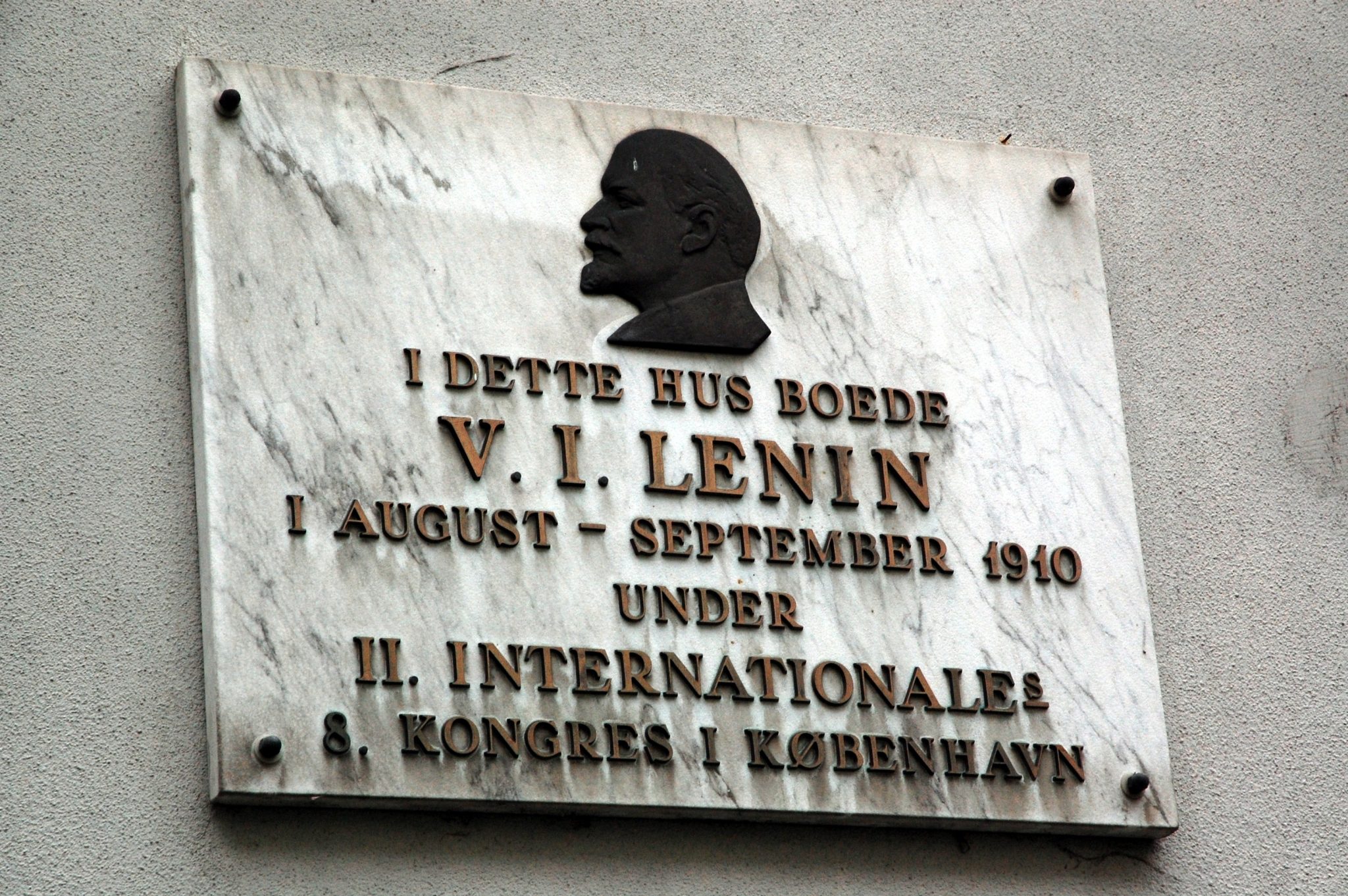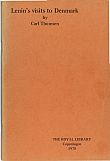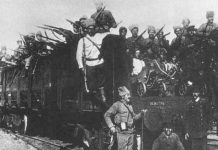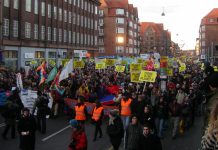
Scanned from the phamphlet:
Lenin’s visit to Denmark, by Carl Thomsen. Published by The Royal Library, Copenhagen, 1970, 18 sider. Kgl. Bibl. Tryk. Published for the participants of The IFLA General Council, Moscow 1970.
The author is the former director of the Copenhagen Public Library.
Scanned and published online by Modkraft.dk/Tidsskriftcentret, May 2010.
See also at Socialist Library, Copenhagen:
Lenin’s visits to Denmark
By Carl Thomsen
When in the spring of 1907 the Russian Social Democratic Labour Party was going to hold its 5th Congress, Copenhagen had been chosen as the place for the meeting. In Russia, where at that time the forces of reaction were felt to be strong, the Congress could not possibly take place. Illegally, the participants got over the Russian frontier. Their number is unknown, some sources say about 90, others about 300. But among them was Lenin.

However, immediately after the participants had arrived, the Danish Ministry of Justice prohibited the holding of the Congress in Denmark, and the police insisted upon the delegates being out of the country within 12 hours.
Ineffective as it was at that time, the Danish Social Democratic Party could not manage to get the expulsion order cancelled, but they helped the delegates, supporting them with gifts and loans, to get to London, where the Congress was carried through.
By this first “visit” to Denmark, Lenin’s previous experience was confirmed that the arm of the Tsarist regime is long. The fact that the Tsar was a brother-in-law of the Danish King no doubt contributed to the yielding tactics of the Danish authorities. In some of the towns which the Russian delegates were passing on their way to Esbjerg, the expulsion order gave rise to demonstrations of sympathy by the workers in favour of the delegates. The Congress in London was reported in the Danish newspaper, called “Socialdemokraten”, and in these reports Lenin was mentioned partly as the leader of the Bolsheviks, partly as the chairman of the Congress.
When three years later the Danish Social Democratic Party was to act as host for the 8th International Socialist Congress, it was but natural after what had happened that the leader of the party in advance obtained the promise of the Government that legal steps would not be taken against the delegates. And this promise was kept.
The Congress, which was opened on the 28th of August, 1910, in Copenhagen, had about 800 participants. From Russia came 39 participants, and among these were Lenin, Plekhanov, Trotskij, Lunatjarskij and Mrs. Kollontay. From the shorthand report of the Congress appears that Lenin did not speak on that occasion, neither in the plenary sessions nor in the committee of co-operation, in which he represented Russia together with Lunatjarskij. It is known that Lenin prepared the resolution which was put to the meeting as regards co-operation, and which should define its problems in the class struggle. Together with Plekhanov, Lenin had a seat in the presidium of the Congress.
It was the desire of the Russian refugees in Copenhagen that a meeting should be arranged with one of their compatriots, who was to give them some information about the present situation in their native country. Only one was willing to spend time in meeting this narrow circle of refugees ”” viz. Lenin. But they were probably not cheated.
When arriving in Copenhagen, Lenin had a friend among the Russian refugees, Mihail Kobezky, who welcomed him and arranged for his lodging. From Paris Lenin had announced that he intended to stay a few weeks in Copenhagen, studying Danish agriculture and especially the co-operative movement. The room, which Kobezky procured for him (a backroom, 112 Vesterbrogade) was an extremely modest one, but it suited Lenin very well. Incidentally, his simple working table was until a few years ago still displayed by the hostess by request, but Mrs. Alexandra Kobezky arranged for the table to be moved to the Lenin-Museum in Moscow, where it is probably the only visible memory left of Lenin’s stay in Denmark.
Lenin had no friends among Danish Social Democrats. But Kobezky introduced him to a Danish Socialist, whom Lenin came to appreciate very highly. It was the language teacher Gerson Trier, about whom Lenin at his departure is reported to have said to his friend Kobezky: “Seldom did I meet such a clever man”. Some information about Lenin’s Danish contact-man might, therefore, be useful.
Gerson Trier (1851-1918) belonged to a family of property and he had a university degree himself (M.A. in French). As a young man he worked for some years with commercial houses in Paris and London. Here he got acquainted with socialism and translated Fr. Engels’: The Origin of the Family, Private Property and the State ”” which was published in Danish 1888. After returning to Denmark the same year, Trier started a correspondence with Engels and became one of the founders of the Socialistic Weekly “Arbejderen”, the attitude of which towards the Social Democratic leaders caused his expulsion from the Social Democratic Party in 1890. But in 1901 the expulsion was given up and Trier became a member of the executive board of the party until he resigned from the party in 1916 as a protest against a resolution of allowing the leader of the Social Democratic Party to join the non-Socialist Government as a “supervising minister”. One of the reactions to Trier’s decision of resigning from the party was a sharp article written by Lenin, dealing with the presence of Social Democratic ministers in non-socialist governments, and a compliment to the resigner, saying: Bravo, comrade Trier!
Trier’s correspondence with his foreign connections was in accordance with his own wish destroyed after his death. We, therefore, know little of his contact with Lenin. But among Danish socialists it is today the generally accepted view that the well-informed and self-effacing revolutionary, Gerson Trier, was the Dane with the very best chances of appreciating the importance of Lenin.
As was his custom, Lenin spent much time in Copenhagen studying. Already before his departure from France he was aware that he would use his stay to visit the libraries in Copenhagen. On the 8th of August, 1910, Lenin wrote to the above mentioned Russian emigre, Mihail Kobezky, who was living in Copenhagen: My esteemed comrade! I venture to write to you in a small personal matter. I should like to take advantage of the congress in Copenhagen to work for some time in the library of Copenhagen and should be grateful to you for giving me the following information: 1) Is the library of Copenhagen (the national library or the university library, I don’t know which of them is to be preferred, I need some material on agriculture in Denmark) open all September…..”
That Kobezky did give Lenin the information he asked for appears from Lenin’s reply, telling that he was “very grateful for the information given and for his kind offer to help”.
From an eyewitness account tape-recorded in 1970 by a reading room guest, who used to work at the same table as Lenin, we know that Lenin was a regular visitor to the Royal Library, but whether his name (or any probable cover name) was entered in the registers remains uncertain, because these are kept only for a certain number of years.
In Lenin’s files receipts issued in the reading room and bearing the name “Ulianof” have been found, and from these receipts we know that Lenin on September 15th, 1910, ordered the work by Funch: “Die landwirtschaftlichen Betriebsverhaltnisse der bauerlichen Milchwirtschaften in Havillande”. Berlin, 1909, and “Danmarks Statistik. Statistiske Meddelelser”. Vol. 32. 1909. Kjøbenhavn. But from the Swedish text printed on the receipts it is obvious that the loan did not take place in the Royal Library in Copenhagen, as previously assumed, but in the Kungliga Biblioteket in Stockholm.
Lenin’s stay in Copenhagen, including his visits to the Royal Library, was the subject of a lecture given by Michail Kobezky, the ambassador of the Soviet Union in Denmark from December 1924 till August 1933, in the Danish-Russian Society on 11th May, 1932. The manuscript of the lecture, which was held in Danish, now belongs to the collection of manuscripts of the Royal Library, from which the following quotation is taken: “In the autumn of 1910 the great international Socialist Congress was held in Copenhagen. Before the congress Lenin wrote to me that he would take this opportunity to study statistical material in the Royal Library …. Lenin was quite satisfied with the conditions in the Royal Library. He was impressed by the order and discipline maintained there, and altogether he enjoyed his stay in Copenhagen ….” That Lenin showed a special interest in Danish agriculture, in particular in the economic aspects of the co-operative movement, seems natural, considering that he devoted some time to these subjects before and after 1910.
The critics of marxism regarded the priority of small holders within Danish agriculture as a proof that the theory of concentration put forward by Marx did not work. In 1907 Lenin had carried out an analysis of the economic situation of Danish agriculture during the last 25 years of the 19th century, based on the statistical information available. Under the title “The Ideal Country for the Adversaries of Marxism in the Agricultural Question” this analysis forms part of the treatise “The Agricultural Question and the Marx Critics” which is included in Lenin’s complete works. The Marx critics maintained that both the distribution of land and the development of animal husbandry in Denmark proved that the small farms were economically superior to large scale farms, and that the average size of farms was declining (from 15,5 hectare in 1873 to 13,7 hectare in 1895). By working up this material it was possible for Lenin to prove that the share of large scale farms of the total area had increased within the same period from 14,3 to 15,6%.
During the same period the number of large scale farms had increased from 1856 to 2031, and the number of holders of 2/3 of the land had decreased from 13,2% to 11% of the total number of landowners. Lenin takes this as a proof that there is also in Denmark an amalgamation process going on within the agriculture in accordance with the trend of development as demonstrated by Karl Marx.
Today nobody will deny that Danish agriculture has progressed rapidly to the benefit of large scale holders. After the second world war the number of farms was reduced from 210.000 to about 155.000 and the number of agricultural workers decreased from 350.000 to less than 50.000. Whether the Danish agricultural policy – seen from an anti-capitalistic point of view – would have been more realistic, in case Lenin’s prognosis had been known and discussed at an earlier stage, is a hypothetical question. Through generations Danish agricultural policy was based upon the conviction that the co-operative movement was able to guarantee the ability of small holders to get through.
In 1912 Lenin again takes up the question of the Danish economic situation. In an article “Capitalism and People’s Consumption” he demonstrates that the increasing prosperity of the upper class is also in Denmark counterbalanced by an increasing poverty of the proletariat and the ruined lower middle class, which was previously made up by farmers, artisans or small shopkeepers. Lenin gives as an example that Denmark in spite of being one of the most important countries in the world as far as the production of butter is concerned – and therefore also in the field of butter export – is obviously the most important consumer of margarine, and this circumstance he regards as an outstanding feature in the capitalistic tendency of our economy.
Also Denmark’s connection with the outside world attracted Lenin’s attention. Denmark’s economic dependence on Germany, from where the major part of our imports is coming, including a considerable amount of capital investment, was analysed. Denmark’s connection with the colonies (the Faroes, Iceland, Greenland, and the West Indian Islands) was critized, taking into consideration our aspirations with regard to the compatriots who since 1864 lived under German control. The sale of the West Indian Islands to the U.S.A. in 1916 for 25 million dollars is characterized by Lenin as sale of people.
The co-operation between Danish and German Social Democratic leaders in 1917 with the purpose of starting an initiative of peace was described by Lenin as being the creation of the Government of the Emperor William. His characterization of the leading Danish Social Democrats (Borgbjerg and Stauning) was extraordinarily severe. “We warn”, Lenin wrote, “the workers against having confidence in this conference, which Borgbjerg invites you to, as this conference of pseudo-socialists is in fact just a show, behind which the plots of diplomates are concealed”.
Although Lenin was critical towards Danish policy as a whole and towards the opportunism of the Danish Labour movement, he does not seem to be unfavourably disposed to the country. Anyhow, during his congress visit in 1910 and later on during the world war he was planning to move to Copenhagen, letting the foreign editorial office and secretariat of the bolsheviks have their seat here. Both times, however, he had to give up his plans on the advice of his friends, who had a better knowledge of the local conditions. Mihail Kobezky, (who was incidentally the first ambassador of the Soviet Union in Denmark) – has undoubtedly also in the question of moving been a good adviser to Lenin.
As in the spring of 1917 Lenin and his companions returned to Russia from their exile, few Danes probably had any idea of Lenin’s importance so far, and nobody at all could imagine that this scientist and socialist theorist of modest pretentions would some day make a landmark in the history of the world. One of Lenin’s Danish admirers, the author Martin Andersen Nexø, who for the first and single time in 1922 had seen and heard Lenin in Kreml, wrote in 1940 on the occasion of the 70th anniversary of Lenin’s birth:
“At that time it was not yet possible to recognize the immense range of his creation, the October-Revolution …..Today he and his work have come to embrace everything. Nothing hapÂpens of importance to mankind which cannot be traced back to Lenin and the Revolution…..He presented the greatest problems of mankind, connected the past with the present and extended it ahead so that everybody must be able to see that things must develop that way…..
Had he lived all men’s lives?”































